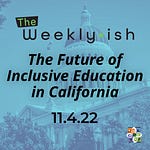Hi, Y’all!
First a big shoutout to all my kids for leveling up this year. I’m now the proud father of a 16, 13, and 10-year-old. The single-digit days are over.
Thanks for being great kids. I love being your dad.
Oh, and by the way. Welcome to our new subscribers and listeners. Remarkably, we went from 209 downloads for our August 5 edition of the Weeklyish to 700 downloads for our latest episode on August 19. I sincerely appreciate it.
If you are wondering who this Tim Villegas guy is, please check out “The Misunderstood Inclusionist,” for a little background info on me and why I’m extremely fortunate to do what I do.
So, one of the perks of the job is that I get to read and think about inclusion. When I was a special education classroom teacher, I still did this. But I didn’t give myself dedicated time to digest the information.
For this edition of the Weeklyish, I wanted to share two journal articles that I think you’ll find interesting and possibly give you hope for a unified educational system. There is another one that I don’t think deserves any of your time, so I’m not going to mention it. But some themes are not uncommon in any critique of an “all means all” philosophy, and I have a few things to say about that.
First up is an article (from 2020) by Michael Giangreco. It’s called “How Can a Student with Severe Disabilities Be in a Fifth Grade Class When He Can’t Do Fifth-Grade Level Work?” Misapplying the Least Restrictive Environment.
Isn’t that a great title? It is from the journal Research and Practice for Persons with Severe Disabilities.
Here is the big idea: the concept of Least Restrictive Environment or LRE should facilitate inclusive placement for students with extensive support needs. Instead, LRE often is used as justification for a segregated placement in a special education classroom.
How many times have you heard, “well...this student’s LRE is an autism classroom.” I would argue that the Least Restrictive Environment is meant as the general education classroom. All other placements are just plain restrictive.
Here is an excerpt from the article. It’s Giangreco’s concluding statement.
The fact that so many students with severe disabilities are being successfully included in general education placements is evidence that it can be done, and begs the question of why it is happening in some schools and not in others. Even in those situations where students with severe disabilities are placed in general education classes, there is undoubtedly much work that remains to be done because placement in general education classes is necessary but not sufficient to be truly included. In the words of Dr. Martin Luther King Jr., “The arc of the moral universe is long, but it bends toward justice.” The US history of general education class placement of students with severe disabilities has followed this long slow arc toward inclusion and justice. Granted, we still have a long way to go! Whatever steps we can take to continue and speed up the process are important so that more students can benefit from inclusive schooling sooner, rather than later, if at all.
I want to reiterate what Giangreco says here: general education placement is necessary but insufficient. Ok. I’ll get back to that in a minute.
Take a deep breath. Ready for the next one?
This article is “An Interview on District and School Transformation: Practical Approaches to Facilitating Sustainable Systemic Change.” And it’s from a journal called Inclusive Practices from 2021.
If you’ve been following me for any length of time, you’ve probably heard me talk about school districts that are right now changing their practices to become more inclusive. Well in Illinois, there is a special education cooperative that is reimagining what education services look like for all learners.
A regional cooperative has a number of districts that they serve in various ways, but historically through special education classrooms and indirect services like professional development. And so, when Dr. Kurt Schneider came to True North, the focus of the cooperative changed to assist with providing instructional supports and services within general education curriculum and classrooms, so learners could be meaningfully included in their home schools and communities.
Here is an excerpt from the interview:
By the end of the first year with Dr. Schneider, Board members all understood IDEA, the history of legislation, the impact it had on school systems, the ways in which funding had fallen short, and had a deeper understanding of the concept of LRE and its intent. The people at our table began to understand why inclusive education was important, that every student was a general education student and deserves an enviable life, and that community connection was critically important.
At MCIE, one thing we talk about a lot is creating a shared understanding of inclusion. And that’s exactly what True North has attempted to do. Understanding the What, Why, and How of inclusion is so important. And that is something we (as in MCIE) love to do. Let us know if you are looking for a partner in creating a shared understanding of inclusive education.
Ok. Finally. The article that shall not be mentioned.
There is a common theme with any criticism of the inclusive education movement. Which you are a part of BTW. So, welcome to the club.
Inclusionists get painted as though we want to completely eliminate special education, disability labels, and related services.
That’s simply not true.
We don’t want to get rid of specialized instruction or services. But just because we provide special services doesn’t mean it needs to be in a separate or special place! Granted, sometimes labels are useful but not for using language like, “how many autism kids you have in your classroom,” or identifying learners and teacher by their acronyms. And yes, teachers need to be expected to teach all learners, but that doesn’t mean we get rid of specialists. General and special education teachers need to collaborate. That means one unified system, not simply eliminating special education teachers or services.
As Lee Ann Jung et al. say in their book Your Students, My Students, Our Students: “[Learners] who have disabilities do not have "special needs"; they only have special rights. And any [learner] who has a need, with or without disabilities, may benefit from the expertise of a specialist.”
Inclusionists also get criticized for using the phrase “all means all,” which people interpret as meaning we want all learners in general education classrooms one hundred percent of the time no matter what.
As I’ve said before, and most recently a few paragraphs ago, placement is the beginning, but it doesn’t mean that a learner is meaningfully included.
For more on that you can read my piece called, What Does Inclusive Education Really Mean?
And something that our critics often leave out is that in a unified system, instructional practices will have to change. We can’t go on with business as usual and expect that learners with and without disabilities can coexist in the same location without changes to the entire system. But I guess it is easier to paint us with broad strokes than admit that we may have a nuanced view of how inclusive education works in the real world. “All means all” may be a simple mantra but we’ve actually seen it work. When I say, “all means all,” I’m saying that all learners deserve to be meaningfully included in their neighborhood schools alongside their same-age peers. I think that’s one concept everyone can get behind.
That’s all the reading and thinking we have time for today.
If you have questions or comments email me at tvillegas@mcie.org or go to mcie.org to learn more about how we can partner with you and your school or district.
Thanks for your time, everyone. I’ll be back in a couple of weeks with another edition of The Weeklyish.
Have a great week!
ICYMI
Why is inclusion important? Here is what you said.
Dr. Ross Greene | Using Collaborative and Proactive Solutions to Support All Learners
What Does Truly Meaningful Inclusion Mean to You?
Dr. Mona Delahooke | Beyond Behavior Charts and Positive Reinforcement
Around the Web
Netflix Looks To Increase Disability Representation In Kids’ Shows
Inside Six Flags’ Efforts To Make Its Parks More Inclusive
10 Focus Areas to Evaluate the Effectiveness of UDL in the Classroom
All Teachers, All Classrooms, All Hands-on Deck
What I’m Reading

What I’m Watching
The Resort | Official Trailer | Peacock Original
Pod Recs
Ontario to disabled teen: lose funding or independence (The Matters)
How School Privatization Has Undermined Democracy in New Orleans (Have You Heard)
Womb Wars pt.1 (American Hysteria)
Im Aufzug mit Prof. Dr. Maren Urner, Neurowissenschaftlerin (Im Aufzug)
Introducing: The Loudest Girl in the World
What I’m Listening To
What’s in my Timeline
“Someone recently shared a comment from a frustrated person who said “Jordyn makes typing look so easy.” I’ve been processing this for a few days and here’s the problem with statements like these:” via @jordynbzim

From the Wayback Machine
3 Things About Teaching and Learning for Students With Disabilities
Just Because
The Secrets of Nickelodeon's Hidden Temple
...
The Weeklyish is written, edited, and sound designed by Tim Villegas and is a production of MCIE.
Our intro stinger is by Miles Kredich.
And our outro is by REDProductions.
For information about inclusive education visit mcie.org and check out our flagship podcast, Think Inclusive, on your favorite podcast app.















